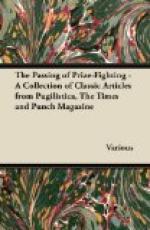* * * * *
With Serbia into Exile (MELROSE) is a book that will suffer little from the fact that its tragic tale has already been told by several other pens. Mr. FORTIER JONES, the writer, has much that is fresh to say, and a very fresh and vigorous way of saying it. His book and himself are both American of the best kind—which is to say, wonderfully resourceful, observant, sympathetic and alive. From a newspaper flung away by a stranger on the Broadway Express, Mr. JONES first became aware that men were wanted for relief work in Serbia, and “in an hour I had become part of the expedition.” That is a phrase characteristic of the whole book. Though the matter of it is the story, “incredibly hideous and incredibly heroic,” of a nation going into exile, Mr. JONES has always a keen eye for the picturesque and even humorous aspects of the tragedy; he has a quick sense of the effective which enables him to touch in many haunting pictures—the delusive peace of a sunny Autumn day among the Bosnian mountains; the face of KING PETER seen for a moment by lamplight amid a crowd of refugees; and countless others. More than a passing mention also is due to the many quite admirable snapshots with which the volume is illustrated. The author seems successfully to have communicated his own gifts of observation and selection to his camera, an instrument only too apt to betray those who look to it for support. One is glad for many reasons to think that our American cousins will read this book.
* * * * *
The Man in the Fog (HEATH, CRANTON) is a book that I find exceedingly hard to classify. Its author, Mr. HARRY TIGHE, has several previous stories to his credit, all of which seem to have moved the critics to pleasant sayings. But for my own part I have frankly to confess that I found The Man in the Fog somewhat wheezy company. The Man of the title was a kind of Northern Joseph, dismissed from a promising partnership with Potiphar after a domestic intrigue on the lines of the original. The fog happens when, years later, he meets the daughter of Mrs. Potiphar returning to her mother’s house, and (at the risk of the poor girl catching her death) detains her on the front step with foggy allusions to the mysterious past. I may mention that his own conduct in the interval had been such as I can only regard as a lamentable relapse from the altitude of the earlier chapters. But it is all vastly serious—it would perhaps be unkind to say sententious—and wholly unruffled by the faintest suggestion of comedy. For which reason I should never be startled to learn that HARRY TIGHE was either youthful, Scotch, or female (or indeed, for that matter, all three). In any case I can only hope that he, or she, will not resent my parting advice to cultivate a somewhat lighter touch, and the selection of such words as come easily from the tongue. Some of the dialogue in the present book is painfully unhuman.




